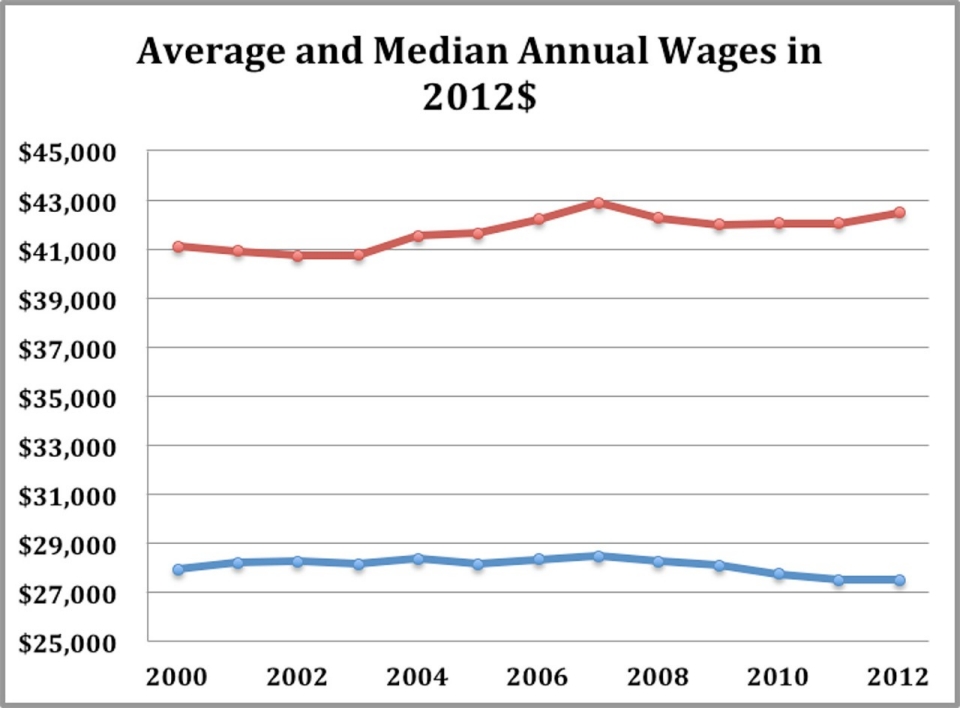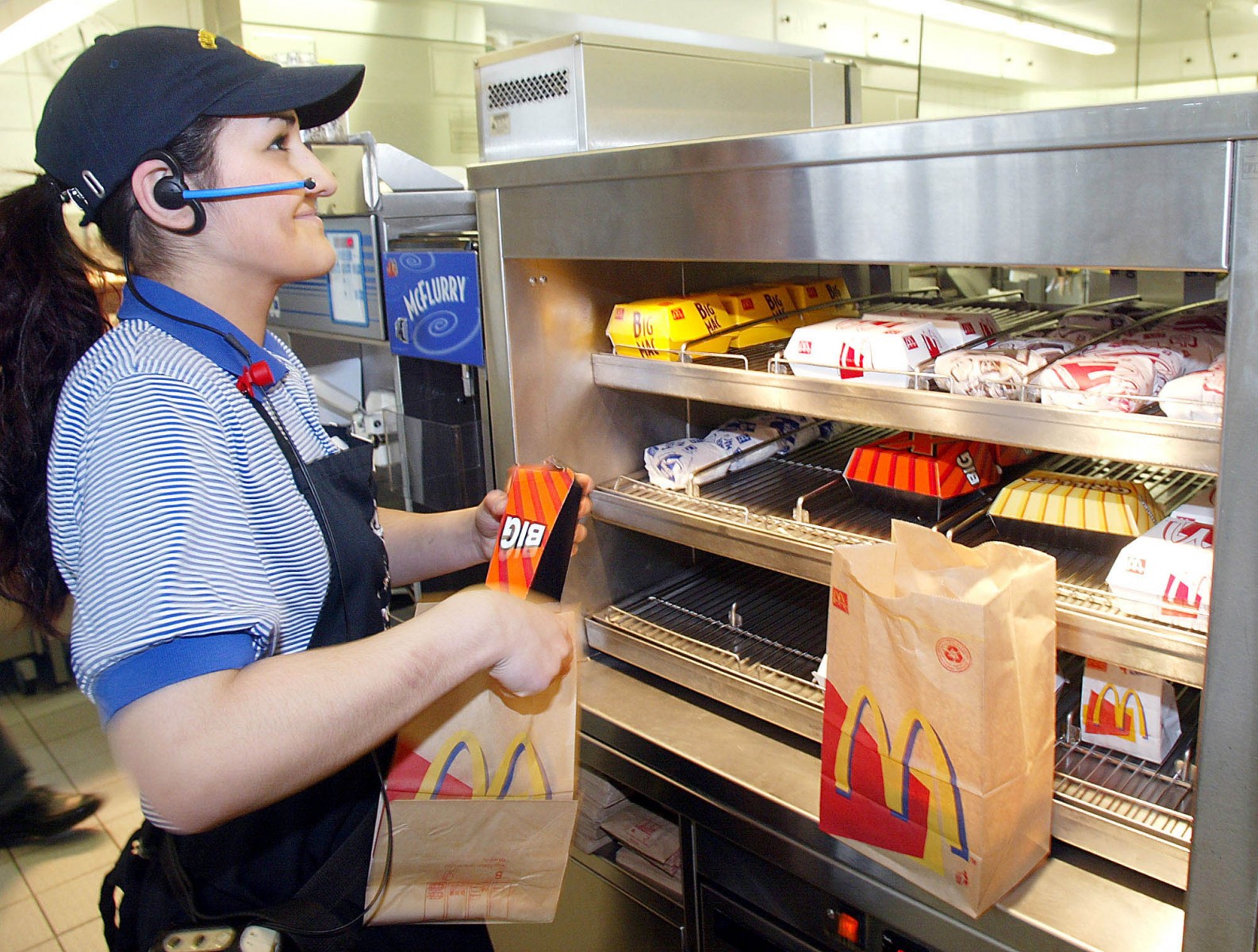
Last year the median wage hit its lowest level since 1998, revealing that at least half of American workers are being left behind as the economy slowly recovers from the Great Recession.
But at the top, wages soared — the latest indication in a long-running trend of increasing inequality, with income gains going to top earners while the majority of workers see stagnant or falling wages.
Al Jazeera is the first news organization to report these figures from the Social Security Administration (SSA), which were released late in October.
The median wage — half of workers make more, half less — came to $27,519 last year, virtually unchanged from 2011. Measured in 2012 dollars, the median wage was down $4.
The 2012 median wage was at its lowest level since 1998, when the median stood at $26,984.
From its all-time peak in 2007, the median wage was down $980. That means someone at the midpoint in pay worked 52 weeks last year but earned about the equivalent of working just 50 weeks at 2007 pay levels, the last peak year for the economy.
The average wage, on the other hand, improved last year. It increased to $42,498, up $434, or 1 percent from 2011 after considering inflation. But the average wage remained below its $42,921 peak in 2007, I calculated from the SSA data.
These figures from the SSA cover only cash pay, not fringe benefits such as health insurance and pensions. The figures are reported to the Internal Revenue Service to verify what individuals put on their tax returns.
What the Numbers Mean
When the average wage grows but the median wage stagnates, it means that, statistically, only workers in the top half of the job market are experiencing increases. My analysis of SSA data shows the growth is mostly in the top quarter, which starts at just under $50,000 in annual pay.
In 2012, the data show, 67. 1 percent of workers earned less than the average, up from 66.6 percent in 2011 and 65.9 percent in 2000. When a rising share of workers makes less than the average wage, it is another sign that wage increases are taking place only high on the income ladder, not on every rung.
There was one good sign in the data: More Americans had work in 2012. The number of people with some work increased by 2.2 million since 2011, to 153.6 million, almost exactly the same increase as the population.
But even with that modest 1.5 percent increase in the number of people with work, the total remains well below the all-time peak of 155.6 million with a job in 2007.
Since 2000 the population has grown by more than 11 percent, but the number of people with jobs increased just 3.7 percent. That is, population is growing about three times as fast as jobs are.
All these data illustrate how Washington is failing to address one of the most basic needs of the American people: work.
Had jobs grown since 2000 at the same rate as the population, last year the nation would have had 11 million more people working. That would have meant a sharp reduction in human misery. It also would have had the twin virtues of reducing demand for social services while increasing tax revenues, which in turn would help bring down the already rapidly shrinking federal budget deficit.
Total wages paid in 2012 came to 2 percent below the peak year of 2007. Adjusted for population growth, however, the decline is much larger.
Total real wages per American were 6 percent lower in 2012 than in 2007. Compared with 2007, that 6 percent real decline in per capita pay means Americans working 52 weeks in 2012 collected paychecks equivalent to just 49 weeks in 2007.
Effectively cutting three weeks of pay from the overall economy shows that almost six years after the Great Recession began in December 2007, the economy is far from getting back to where it was, much less growing beyond it.
All these data, even the modest increase in the number of people with jobs, illustrate how Washington is failing to address one of the most basic needs of the American people: work.
In the long run, failing to address these problems will have profound effects, including added costs for government services, reduced tax revenue and a weakened work ethic. If workers do not gain wage increases from their increased productivity, they have little incentive to invest in gaining skills or to work harder.
Gains at Top
While most workers are having a tough time, the SSA data reveal a dramatically different story at the top of the job market. The number of workers making $5 million or more grew almost 27 percent, to 8,982 workers, up from 7,082 workers in 2011. Total wages earned by these highly paid workers grew 40 percent — 13 times the overall increase in compensation for workers.
Even higher up the ladder, the number of workers making more than $50 million soared even more, from 93 in 2011 to a new record of 166 people in 2012. Average pay at this stratospheric level grew almost 20 percent, from $81.4 million in 2011 to $97.5 million last year.
Another big winner in recent data is corporate profits, thanks to actions taken by the Bush and Obama administrations since 2007, including the bailouts of Wall Street and the auto industry.
Since 2000, corporate pretax profits, adjusted for inflation, have more than doubled, reaching record levels.
Pretax profits of all firms in 2012 totaled $1.77 trillion, compared with $800 billion in 2000. That is a gain of 121 percent. During the same period, total real wages grew by just 7 percent, less than the 11.2 percent population increase.
The growth of pretax profits at 17 times the increase in total wages tells us a great deal about the parallel increases in wealth at the top and want for middle- and low-income earners.
These disparate trend lines illuminate how government policies shape (and distort) the economy. The good news is that Washington can change those rules so that the U.S. economy both is more robust and benefits all people who work or want to work. The question is whether — and how — this will happen.
3 WAYS TO SHOW YOUR SUPPORT
- Log in to post comments













